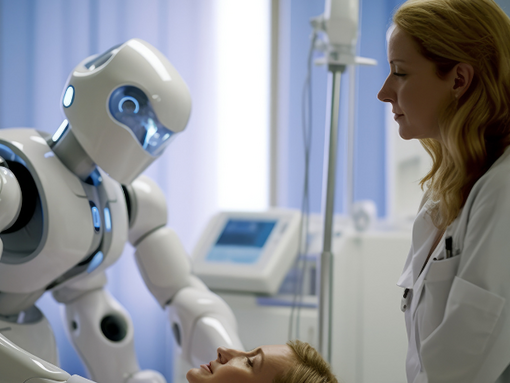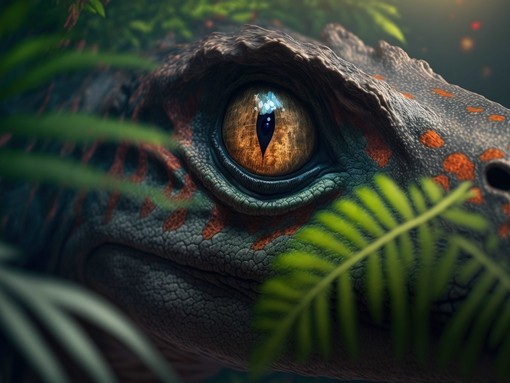
How ChatGPT’s newest release will impact recruitment
Contents
- AI: An inevitable technological (r)evolution
- Enhancing recruiting processes with AI
- Strategic steps that businesses can take to improve their operations with AI
- Invest in more valuable relationships
- Prioritise customers and their individual needs
- Optimise talent acquisition
- Can AI really improve your business operations?
Contents
Since its launch in 2022, ChatGPT has dramatically transformed content creation. Now, with its newest image generation release, the technology is set to open up even more possibilities for many industries, including recruitment.

The new Open AI’s GPT-4o release introduces a “natively multimodal model capable of precise, accurate, photorealistic outputs.” This means AI can now create photorealistic images… almost instantly. From hyper-personalised advertisements to realistic candidate avatars to immersive career content, opening new possibilities for talent acquisition.
Although it caused a lot of concern recently – mainly around AI-generated images in Studio Ghibli style, pointing out potential copyright violations – some people view AI as a controversial development, while others hail it as ‘the biggest opportunity of our lifetime.’
The ability to generate high-quality images in seconds challenges traditional creative industries, but its potential impact on recruitment is undeniable. Imagine building hyper-targeted visual campaigns tailored to individual candidates. Or transforming career sites into personalised, dynamic experiences. Or using avatars to simulate interview scenarios, onboarding, or even entire employer brands. AI redefines what once was considered impossible.
But it’s not only about enhanced visuals. This marks a transformative shift in how businesses approach hiring.
As the AI expansion is impacting all sectors and both personal and work lives, organisations should embrace its potential rather than resist AI’s rapid advancement. The scale of opportunities in recruiting is enormous, from enhancing efficiency, diversity and engagement to completely transforming how recruiters operate.
Will you lead the change or get left behind?
AI: An inevitable technological (r)evolution
Like every era-defining leap before it – from the invention of cell phones to the rise of smartphones and traditional media to the internet – AI is the next step in tech. A big step. Perhaps the most transformative. And it is already happening.

We’re not waiting for the AI revolution. We’re living in it.
AI is already taking over the world. Not in the apocalyptic way some people fear, but it is quietly embedding itself into nearly everything we do, reshaping industries, challenging assumptions, and forcing businesses to rethink what’s possible. Recruitment included.
While much of the recent debate around AI has focused on its effects in creative fields – recreating Studio Ghibli animations with the newest ChatGPT-4o – AI is already well-established in more critical sectors. In healthcare, AI enhances diagnostic processes and detects early signs of diseases. In manufacturing, it removes inefficiencies that humans miss. In transportation, it brings autonomous vehicles and optimised logistics. And in recruitment? It’s rewriting the playbook.
From automating tedious admin work to predicting candidate success with data-rich insights, AI is not just speeding up the hiring process; it’s smarter, sharper, and more strategic than ever before. It is making space for recruiters to do what machines can’t: connect, understand, and empathise.
This isn’t just about tools. It’s about a transformation in how we define value, creativity, and human potential.
Because when content becomes instant and cheap, connection becomes rare and priceless.
AI isn’t coming for your job. But it is coming for the way you work and the companies that thrive will be those that ask not “What can AI replace?” but “What can we become because of it?”
Enhancing recruiting processes with AI
With the recent GPT-4o image generation release, its average weekly usage has hit 150 million users for the first time. It proves that people are curious. They are exploring, experimenting, and integrating AI into their lives faster than ever.
And business is catching up… According to McKinsey & Company, the number of companies using generative AI in at least one business function jumped from 65% to 71% in just a few months. Recruitment is no exception, with AI already proving its value by reducing the average cost of hiring a candidate by 71%. As industries evolve, businesses must act now to integrate AI into their hiring strategies or risk falling behind.

With the scale of possibilities that AI expansion brings, the talent industry can dramatically change its operations. Already, recruiters use the text-based ‘conversational’ version of ChatGPT for streamlining and automating a lot of processes, such as summarising resumes, drafting job descriptions, personalising outreach emails or communicating recruitment strategies better.
The new era, that began with the new ChatGPT’s image generator, takes the initial release to the next level and really redefines the boundaries between imagination and reality. If you can create anything just in a couple of seconds and for free, then only your imagination is the limit.
Strategic steps that businesses can take to improve their operations with AI
For organisations, the rise of AI presents a pivotal opportunity to rethink how they operate, where they create value, and how they allocate resources. But integrating AI effectively requires reshaping the business foundation which is not only about adopting a tool anymore.
According to 21% of respondents – from the aforementioned Mckinsey report – who reported using Gen AI at their companies, at least some workflows had been completely redesigned. This signals a bigger shift: AI isn’t just supplementing operations, it’s transforming them.
So what does that look like in recruitment? The impact of AI reaches far beyond simply generating visuals or automating processes. It has the power to elevate the entire candidate journey, reframe employer branding, and foster more meaningful human connections.
But, like any tool, the benefit lies in how it’s used. If done the right way, it can transform and enhance businesses.
Invest in more valuable relationships
AI can streamline operations, yes. It can filter CVs, screen candidates, and even predict job fit based on complex data patterns. But its most powerful function? Empowering human interactions and redefining what truly creates value in the hiring process – people. AI can free recruiters to do what they do best: building relationships.
By offloading repetitive tasks, AI gives recruiters the capacity to be more human in their approach – to spend more time understanding candidate motivations, aligning on values, and providing a supportive experience from first contact to onboarding.
Since AI can dramatically improve efficiency, recruiters can dedicate more time to building strong relationships, whether with candidates, customers or partners, ‘relieving’ them from repetitive and administrative tasks, allowing for a more personalised and engaged experience.
Companies that thrive will be those that invest in human connection, focusing on candidate experience, personalised engagement, and culture fit rather than just technical qualifications.
Prioritise customers and their individual needs
Harvard Business Review (HBR) points out that most brands still fall short in personalising their consumer experiences to the level required to compete with the world’s most successful companies.
Think about any advert or campaign that somehow moved you – maybe it tugged at your heart, made you laugh, or just felt it “got” you. Advertising used to focus on emotion. Now, it’s about delivering a full, end-to-end customer experience that considers the entire journey: from awareness to purchase to loyalty. With AI, brands can now understand and respond to not only emotions but also attitudes, actions, and even customer memories – something that simply wasn’t possible before.
Companies like Netflix or Amazon already use AI to personalise experiences and drive engagement. Social media platforms do the same, serving up content that’s been precisely tailored based on user behaviour and preferences (AI algorithms).
In a world built on mass production, personalisation at scale used to be a challenge. AI is changing that. With the right use of AI and leveraging AI-driven analytics, organisations can focus on understanding their customers better and tailor their operations to fulfil customer needs – helping to achieve a much more personalised customer experience. As per the HBR, key issues like generating a 360-degree view of a customer are being resolved by activation tools for AI-driven recommendation delivery, automation, and AI-powered intelligence.
AI enables hyper-targeted ads, customised email campaigns, and individualised content, giving all brands the chance to compete. When used well, AI allows organisations to focus on understanding their customers better and tailor their operations to fulfil customer needs.

Optimise talent acquisition
Hiring the right people has always been one of the biggest challenges in business – not just about filling roles, but about finding the right fit. For recruitment companies, this pressure is even greater, as they work to deliver better outcomes for clients while staying competitive themselves.
This is where AI becomes a true game-changer. From automating the early screening stages to predicting the likelihood of success in a given role, AI enables organisations to go deeper, faster and with greater accuracy.
But the real benefit isn’t just speed. It’s about creating more meaningful, human-centred recruitment journeys.
With AI handling the heavy lifting in data analysis and repetitive tasks, recruiters are free to focus on building trust, understanding motivations, and helping candidates not only find jobs but giving them access to the most suitable and fulfilling careers.
Can AI really improve your business operations?
The release of ChatGPT’s latest version signals more than just another advancement in tech – it marks the arrival of a new era. One that doesn’t just enhance operations, but fundamentally reshapes the way we think about work, creativity, and human potential.
Yes, there are concerns. And yes, the debate about AI’s long-term impact continues. But in the present moment, what’s clear is that AI is already transforming recruitment, from how we attract and assess talent to how we engage and retain it. Time-consuming tasks like resume screening, interview scheduling, and even initial candidate outreach can now be automated, freeing recruiters to focus on building deeper, more human relationships.
But this shift isn’t only about speed or scale. As content becomes cheaper and faster to produce, the true value of recruitment will be measured in emotional intelligence, authenticity, and connection. Where AI handles the data, humans still handle the heart.
For many businesses, integrating AI might seem like a big leap. But transformation doesn’t need to happen overnight. The key lies in thoughtful, strategic integration leveraging AI where it adds the most value and empowers people to do the work that only people can do.
Although it might seem like the world is divided between AI supporters and sceptics, with some fearing its potential to ‘destroy humanity,’ at its core, AI is simply a tool. One that significantly enhances and simplifies work.
Because the future of hiring is already unfolding. The only question is: are we ready to evolve with it?
Contents
- AI: An inevitable technological (r)evolution
- Enhancing recruiting processes with AI
- Strategic steps that businesses can take to improve their operations with AI
- Invest in more valuable relationships
- Prioritise customers and their individual needs
- Optimise talent acquisition
- Can AI really improve your business operations?













